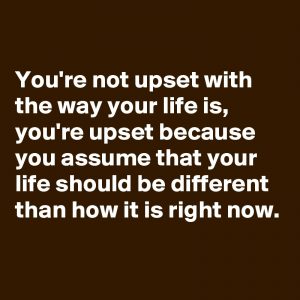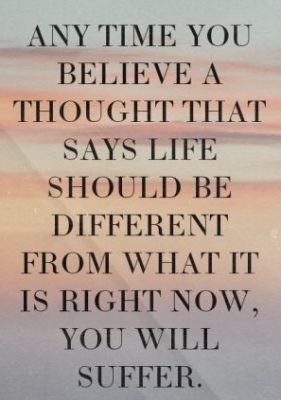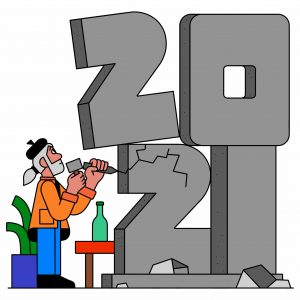Podcast: Play in new window | Download
 If you live like life should be different…
If you live like life should be different…
Two basic components of my teaching: 1. we live in a pretend world, how the world should be, and 2. we’re pissed that the pretense isn’t real.
I watch what articles, what emails get read. And I have noticed that when the title isn’t saying what it should say about you: smart, clever, good, blah blah blah, you don’t want to read the article. Or the email.
Or if you are a client: If I say something about you that I shouldn’t say… you cry ‘bloody murder’, or you may even quit.
What I said didn’t fit the pretend world you live in…
If you prefer new to old and tried, if you prefer going wide than going deep, if you prefer many friends to having one close friend, then… this article is not for you.
If you like excitement… this article won’t excite you. But …
 If you’ve been wondering why you are not as happy and not as successful as you ‘deserve to be’, maybe this is an article for you.
If you’ve been wondering why you are not as happy and not as successful as you ‘deserve to be’, maybe this is an article for you.
I have been teaching my own courses for about 10 years now. And I have been coaching individuals for about 34-35 years.
And I am starting to see something that the seeing of isn’t good news for me, isn’t pleasant for me, but unless I really see it and handle it, I won’t be able to produce the results I know I could.
Yesterday, April 7, was an important date for me: I saw for the first time that a client cannot follow instructions, cannot really do what they studied, maybe even a lot, if they don’t clearly understand the words and therefore the meaning.
I should have known, but then what?!
What am I talking about?
In the Starting Point Measurements I measure your vocabulary’s accuracy. Not the number of words you know, but how accurate is your understanding of words that are in your vocabulary.
 One of my students’ ambition is to become a copywriter. I’ll be talking about him, because I had the insight while I coached him. But he isn’t unique in this. Sad to say, when I look at the numbers on people’s Starting Point Measurements, the highest number I have ever gotten for accuracy of vocabulary is 10%.
One of my students’ ambition is to become a copywriter. I’ll be talking about him, because I had the insight while I coached him. But he isn’t unique in this. Sad to say, when I look at the numbers on people’s Starting Point Measurements, the highest number I have ever gotten for accuracy of vocabulary is 10%.
What does low accuracy mean exactly?
It means that you have only a vague idea of and probably misunderstand 90% of what someone says, given that you don’t exactly know what the words mean.
That means that what you hear is fuzzy… And
- when it comes to instructions, for example, your understanding is crucial.
- When it comes to who to vote for, your understanding is crucial
- Oh, When it comes to who to marry… your understanding is crucial
- When it comes to business deals, friendships, work arrangements: your understanding is crucial.
And your understanding is low.
The word that drove this whole topic up was the word ‘conflict’, important concept when selling.
Not a big deal word. Not a $5 dollar word… A simple word, easy.
And yet when it came to seeing conflicts, finding examples of conflict, including the word in a sentence, the situations did NOT match conflict. They were problems. They were moral judgments. But not conflict.
And to create effective sales letters, which the students would like to do, accuracy of words, and a huge storehouse of seeing conflicts is mandatory.
A conflict creates a situation that pulls the reader in… and sells them something… The purpose of a sales letter.
But given that we are all in sales, given that unless you sell it, there is no value gets produced, without sales no one makes a living.
So whether you know it or not, you are in sales, and your sales results depend on your use of words more than on your actual ability to produce, or the number of other skills you have.
The lower your level of distinguishing conflict the less money you can make, because the less sales you can make… Selling an idea, selling others on you, selling people to do what you want them to do, selling yourself on whatever you want to sell yourself on.
When I came to the US I already spoke, I already wrote English well. Like a native… but with an accent.
And yet, when I started to participate in Werner Erhard’s programs, the number of words that were not clear to me made we want to focus on words, and really learn them.
Generosity, respect, being, authenticity, contribution, compassion… there were tons of words I wasn’t clear about.
The word that first alerted me that there is something amiss was when I the Sex and intimacy seminar the leader said ‘your thrown way of being’… huh? WTF is that? In my mental imagery I saw someone sliding on the dance parquet after being ‘thrown’ by their dance partner… But surely that is not what they were talking about… right? Right?
So I spent years with each word, and increased my accuracy to 30%…
30%? Yeah. Puny 30%.
It was clear to me (when I gave the homework to my students yesterday to find 20 occurrences of conflict before Sunday) that I had, myself, never looked into the word ‘conflict‘ deeply myself, I assumed I knew what it meant.
But ‘knowing what it means’ doesn’t mean it is distinguished from every similar word, that you can recognize it everywhere.
Recognizing it in every situation means you actually distinguished it. That is the meaning of distinction.
Distinctions are the toolset of thinking, strategic or other…
The more distinctions you have the bigger toolset you have.
- A good internist, medical doctor, has 30 distinctions. ‘Puny’ you say, I agree. Yeah, nutrition, lifestyle, etc. are not in his toolbox.
- A good surgeon has 40 distinctions.
- A good engineer has 10 distinctions
A word that is not at least 80% distinguished is not a distinction in this regard.
People, you, can’t see that you have no distinctions, or if you do, you have mighty few.
One of my students is in fashion. Yesterday he shared that people try to knock off his creations, but his stuff sells, the knockoffs don’t.
Why? because my student has a deep knowledge (distinction) of color and its combinations, while the people who try to knock his stuff off have none of that.
My own teachers have 20 distinctions each… and there is hardly an overlap… so with three teachers I have access to learning new distinctions.
My work has, thus far, paid off: I have now 50 distinctions… and I just added one yesterday. Conflict.
OK, I feel there is an unanswered question here: how come I have more distinctions than my teachers, and yet they are 7 figure earners and I am not even close?
Easy really. There are, let’s say, 700 distinctions learnable for a normal person.
100 of them are about making money, managing money, getting money, saving money.
I specialize in distinctions of the human condition. And have only 10 distinctions in the area of making money. So I get coaches who can teach me more…
I have already forgotten my 10 from Architecture School… don’t need them for what I do now.
 Your extrinsic value in the marketplace depends on the number of distinctions you have.
Your extrinsic value in the marketplace depends on the number of distinctions you have.
Skills are ‘distinctions’ of activities you can do well in the world that that produce a result that has extrinsic, monetary value.
When I was a magazine publisher, I needed a team to do a lot of the work. In my hiring I didn’t expect anyone to be able to do the job I needed them to do: so I tested their ability to tell things apart, their ability to distinguish.
I had two college students… and they worked out well.
Everyone else I tried to hire failed the test: they could not tell dramatically different things apart: they had no thinking tools. Seeing tools. So they were useless to me in the business. (The typical question i asked: what is the difference between a catalog and a magazine? Can you tell? Leave a comment if you think you can.)
A chess master has about 40 distinctions, more than a surgeon, or a nuclear engineer. Many of those distinctions are useful in business.
You do a lot of things where you have no idea what you are really doing… no distinction.
Can you increase the number of distinctions you have from reading? No.
The only way to ‘gain’ a distinction is through distinguishing.
Recognizing, identifying, telling it apart from other similar things.
 This morning I was humming a Hungarian folk song about dancing… In it there is a line about Hungarians having a white heron bird feather on their cap.
This morning I was humming a Hungarian folk song about dancing… In it there is a line about Hungarians having a white heron bird feather on their cap.
 I looked up heron, the great white, and observed what it looks like as it’s standing in the water, as it is flying, as it’s eating its prey. I have a little idea what a heron is. Is that a distinction? Not even close… for that I’d have to know other similar birds, herons of a different color, a different subspecies… and I don’t. So no distinction.
I looked up heron, the great white, and observed what it looks like as it’s standing in the water, as it is flying, as it’s eating its prey. I have a little idea what a heron is. Is that a distinction? Not even close… for that I’d have to know other similar birds, herons of a different color, a different subspecies… and I don’t. So no distinction.
As you can see, this shows why you don’t have distinctions, and this shows why you may not have everything money can buy…
In my new podcast every week I discuss with my talking partner, Bonnie some distinction. At this point your best bet is to get that podcast and start learning distinctions. Is listening to the podcast enough? No. But it can start you on the habit of taking it beyond, and start to distinguish stuff…
My specialty is, of course context, behavior, attitudes, emotions, languages… But I am adding new distinctions in the area of money, business, marketing, selling, because I am interested.
You can get the podcast, until tonight, at the introductory cost, and then I’ll raise the price until it gets to where it should be.
One more thing: the podcast is delivered exclusively on my mobile app… that at the moment is on mobile phones and tablets, and soon will be also on desktop, but not yet.
You can buy it now and save a bundle on the long run… But only people with foresight will even understand what I am saying.
Embrace repetition, i.e., seek deep vs. wide knowledge of what you want to learn.
In this email he has 20 tips, most of them apply to you, but in my experience you cannot change more than one thing successfully at the same time. So just change this one habit.. i.e. make it a new habit.
You’ll see results from them, and this is the secret of gaining distinctions: Repetition, deep knowledge.
If you are an excitement junkie, a ‘news’ junkie, a gossip junkie, a titillation junkie, if you go from video to video, article to article, like a butterfly, then you’ll probably NEVER go deep enough to even get the significance of distinction: there is a CONFLICT between what I write and between what you want: titillation.
And that is that.
PPS: Recommended reading: https://www.quora.com/What-are-landmark-forum-distinctions-and-insights-broadly
My overlap with Landmark Education’s teaching is 20%, but the whole concept of distinction and distinctions came entirely from Landmark Education.
